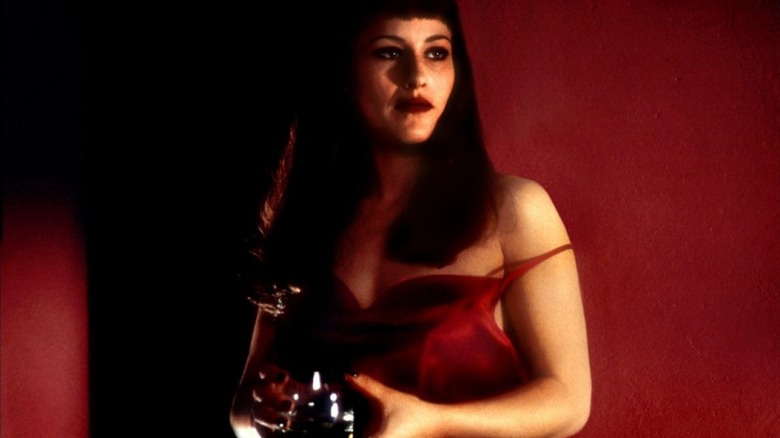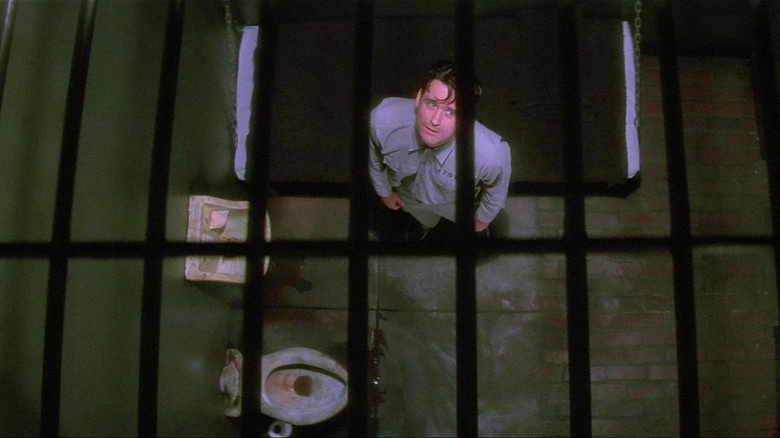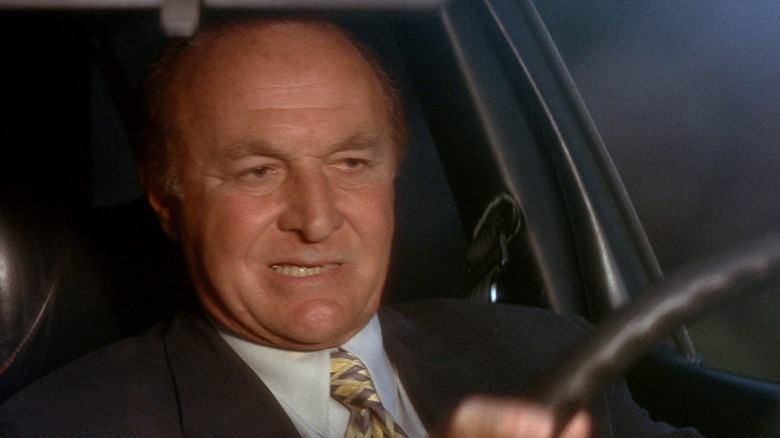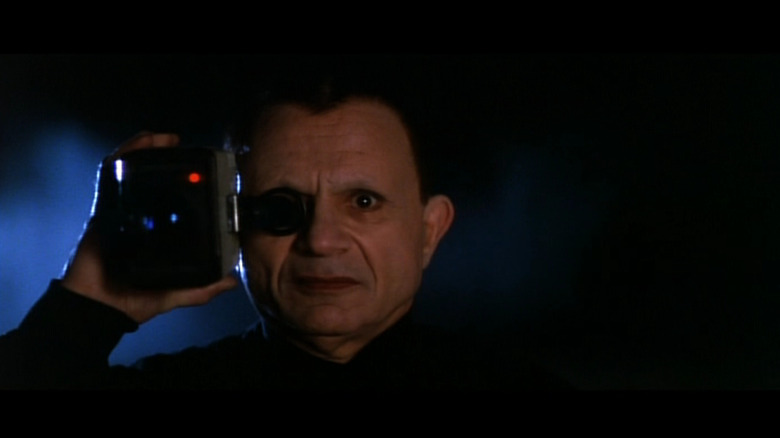
An interesting piece of trivia: Peter Deming, the cinematographer on David Lynch's "Lost Highway," shot Lynch's film, "Scream 2," and "Austin Powers: International Man of Mystery" all in the same year. Immediately prior to "Lost Highway," he shot the cockroach comedy "Joe's Apartment." The man is nothing if not diverse.
"Lost Highway" is an oblique nightmare that swirls haphazardly around themes of identity and sexual insecurity. Its main character -- who may be two main characters -- is lost in a shadowy noir world of demonic cameramen, underground porn, creepy faceless stalkers, and life-threatening gangsters. Lynch's films are typically surreal and oblique, but can often contain a great deal of humanity and recognizable facets of warmth. One might think of Sailor and Lula from "Wild at Heart," or some of the more subtly funny moments in "Eraserhead" (the delivery of "Okay, Paul!" is a scream).
"Lost Highway," however, may be Lynch's coldest film. It's filmed largely in inky shadows and sterile, ultra-clean interiors. The natural world is a black hole. The dominant image of "Lost Highway," the one put on the movie's poster, is a forbidding stretch of road rocketing by at an imperceptible speed, surrounded by night. Life is nothing but a constant, blind, hypersonic rush across the alkali flats to oblivion.
The only companion in that nightmare world is regret. Regret, impotence (in both senses of the term), and failure. And the knowledge that your pain and insecurity will not go unnoticed. Life on the lost highway is like Hell.
It's one of the best films of 1997.
When Fred Became Pete

"Dick Laurent is dead." So says the mysterious voice into Fred's intercom one morning.
A brief rundown on the story: Fred (Bill Pullman) is a jazz saxophone player whose solos are chaotic and sweaty. He lives with his impeccably beautiful and emotionally distant wife Renee (Patricia Arquette). Their lovemaking is unsatisfying, and Fred cannot perform. He is given a condescending pat on the back by his wife who whispers "there, there," compounding his embarrassment on the issue. The couple receives videocassettes, left in envelopes on their doorstep. At first, the tapes are videos of their house's exterior. Later cassettes depict someone sneaking into their home and filming them while they sleep. The final cassette is a film of Fred murdering Renee, and event he has no memory of. Fred is sent to prison.
In prison, Fred ... transforms. He becomes a younger man named Pete (Balthazar Getty). There is no explanation for the transformation. Pete is logically released from prison and allowed to live his life where he has parents, a girlfriend (Natasha Gregson Wagner), and a job as a mechanic. As a mechanic, Pete attracts the eye of a gangster's moll named Alice who is also played by Patricia Arquette. The gangster, played by Robert Loggia, is an imposing and terrifying presence who beats up a man for tailgating. To be fair to "Lost Highway," the tailgating scene is genuinely funny.
Why did Fred transform? One could interpret the transformation as a fantastical re-claim of pathetic masculinity. Fred, in being unable to perform sexually, imagined himself as a younger man with a manly job -- a mechanic -- who immediately draws the attention of a girlfriend as well as an untouchable, dangerous femme fatale.
Masculinity Run Afoul

The plot of "Lost Highway" continues into film noir territory, involving Pete in a dark ring of underground porn production, a plot point that doesn't really strike one as shocking. Eventually, Alice and Pete will, in noir fashion, team up to commit crimes. Lives will be taken, and betrayals committed. Pete, after having been sold out and left to be humiliated, transforms back into Fred. As Fred, he returns to his old home and speaks the opening line of dialogue into his intercom. Dick Laurent is dead.
"Lost Highway" appears to be a wish fulfillment fantasy that is run afoul. Fred is concerned about his own masculinity, and his insecurities over his own genitals led him to symbolically "murder" his marriage. The only way out is to transform into a masculine ideal which, for Fred, is a sullen 21-year-old greaser. A greaser who is cool enough to have an ultrasexual girlfriend as well as an ultrasexual mistress. He's not "cool" or "in control." Fred/Pete doesn't long for power or dominance. He only longs for casual, natural acceptance and adoration for being a sullen greaser.
The problem with Fred's ideal masculine image is that it also must necessarily involve violence. The typical view of machismo is that it carry with it an element of danger and death. A "badass" is -- to offer a base definition -- merely someone capable at causing harm to others. Living in a manly world will necessitate suffering. Someone will die. Killing will occur. In a manly world of noir fantasy, one will inevitably be betrayed.
In this way, "Lost Highway" bears a strong resemblance to David Fincher's 1999 film "Fight Club."
Somebody's Watching Me, And I Got No Privacy

Additionally, "Lost Highway" argues that being emasculated is tantamount to being seen. Once cannot remain cool unless they stay mysterious, kind of in the shadows. Throughout "Lost Highway," Fred/Pete find themselves on camera. Either he is on the cassettes at the film's opening, or he is being filmed out in the open by the Mystery Man (Robert Blake). The idea of being recorded every moment of every day is not necessarily a pinion of anxiety in 2022, but in 1997, it was the very height of paranoia. Not to become a dull Freudian, but the Mystery Man, in holding the camera, might symbolize Fred/Pete's superego. Once he finds he is observed, Fred can no longer pretend he is anyone else. He's a sad man who failed his marriage.
Fred's only choice is to get in the car and drive eternally down the lost highway, the police on his tail. Like a grindhouse Sisyphus, he is eternally condemned to drive away from his fears and insecurities, never resting, never able to let them go. Fred is in Hell. Or perhaps insane. Either way, it's not a good ending for Fred.
Lynch has been married four times since 1968, with one of his marriages -- to longtime collaborator Mary Sweeney -- lasting less than a year. "Lost Highway" is a bold and glorious aesthetic exercise -- it's easily Lynch's best-looking movie -- but also may reveal insecurities the filmmaker had about marriages and the failure thereof.
The late 1990s were, if movies are to be any indicator, also a time of great reckoning. Old world, post-War American institutions were being examined and torn down in films like "Fight Club," "Pleasantville," and "American Beauty." "Lost Highway" is Lynch's version of that reckoning.
Read this next: The 14 Best Noir Movies Ranked
The post Lost Highway Ending Explained: The Utter Failure of Masculinity appeared first on /Film.
0 Commentaires